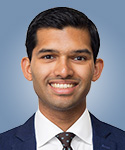November 24th, 2020
“They Don’t Make ‘Em Like They Used To”
Vivek Sant, MD

Dr. Sant is a General Surgery Chief Resident at NYU Langone Health, Bellevue Hospital, and Manhattan VA in New York, NY.
“When I was your age, I walked to school uphill both ways, barefoot in the snow!”
One of my favorite anecdotes from my attendings is about the cardiothoracic ICU experience in the ’80s and ’90s. Reportedly, each resident would arrive on day 1 of the rotation and would remain in the ICU for 30 straight days, being let out for an hour on Sundays — if there was time. I’ve heard it corroborated by so many people, I’m beginning to think that it might actually be true!
While this training model might have had benefits, re: continuity of care, immersive learning, and opportunities for autonomy, it is obviously unreasonable. In recent years, duty-hour regulations have been implemented to protect residents and patients. In 1989, New York state adopted the Bell Commission’s duty-hour restrictions, including the 80-hour work week. In 2003, the ACGME adopted these restrictions across residencies and specialties throughout the U.S.
Today’s training model is kinder. Not surprisingly then, older generations seem to think subsequent generations have lost a certain toughness and ability to handle stress, leading to an overall cultural decline. Interestingly, attendings have rarely been the ones to make me feel lesser for not being forged in the same crucible. Instead, I’ve noticed (and probably contributed to) these expectations of greater toughness and less entitlement from senior residents, and this cascades on down to the interns and medical students.
Fear can hinder learning opportunities
I remember my chiefs and senior residents from my intern year. I was simultaneously in awe of them and terrified of disappointing them. While they sometimes were tough on us, they, in turn, would talk about how much harder their chiefs had been on them! They would laugh among themselves: “Can you imagine if we had asked our chiefs that? Can you imagine if we had presented a consult to our chiefs that way?”
I have learned a tremendous amount from my seniors, and I am grateful for their mentorship. I wonder, though, if I might have learned a lot more with a relationship based less on fear. In the OR recently, I instructed my junior resident, “We’ll place the purse-string sutures, then move on to the Stamms.” “Could we quickly just go over Stamms again?” she replied. I would never have dared to ask my chiefs such a question! (“They’ll think I don’t know… what if they make me feel dumb… they won’t let me place the stitches.”) But I really wish I could have felt uninhibited enough to ask for clarity on a technique! I could have learned so much more. I didn’t think less of the questioner, our attending didn’t seem to mind either, and we ended up sharing a great learning opportunity.
 Culture shift
Culture shift
Ever since my own intern year, I have seen residents collectively judge each new class of interns. “They don’t have the same feeling of responsibility that we did.” “They’re part of the shiftwork generation.” “They complain too much.” “They ask questions without even trying to figure it out themselves.”
My peers and I seem no different than our predecessors in how we view each incoming class. However, I believe we are more understanding of the growing emphasis on work-life balance. This is reflected in how the program’s priorities have changed: We now try to get residents into the OR as much as possible, starting intern year, and there is more focus on wellness and learning. These changes are decidedly positive — we try to get residents home on time whenever possible, we don’t make them sit around idly waiting for their chiefs until 9 pm every day, and we want them to be happier, be more rested, and have more opportunities to learn and operate.
Solution: Clear expectations and greater empathy
As part of this culture shift, residents have a more collegial working relationship: What used to be implied in relationships based on fear is now communicated explicitly in more humane terms: “You should go home on time, but I expect you to complete these tasks and update me before you leave” or “I want you to assess any issues and propose an action plan before you escalate it to me.” Setting clear expectations can take time and might seem harsh, but helps eliminate any misconceptions held by the newer residents. This is invaluable for both resident and patient.
Recently, I talked with one of my attendings about this issue and asked him how he remained patient with all of us residents. He replied, “I worked very hard as an intern, but when I reflect honestly, I know I wasn’t the best intern at all times! I missed out on many major life events of my family and friends. These realizations have made me more understanding of today’s residents.” Such candid self-reflection, humility, and empathy go a long way in helping bridge the gap between instructor and student.
A few months ago, a junior resident called me during the night to clarify something. Such a call would have had one of my former chiefs spluttering, “Why didn’t you call the pharmacist and ask her to help you?” I calmly addressed his questions and hung up. As I was drifting back to sleep, pondering why the resident felt he ought to call me about this issue, I had a brief flash of clarity, “I’m glad he felt comfortable asking me!”



As a 90’s trained hospital-based sub-specialist in private practice, I can assure you that they do not make them like they used to. Hospitalists know less about their patients than the consultants, even if it’s not within the scope of practice of the consultants. Surgeons cut, sew, and leave…wouldn’t even bother to check if there were any delayed complications. For what? A better work-life balance, so I was told.
If you can’t handle the heat, get out of the kitchen. When you take an oath, that means the patient put their faith in you. Apparently onLy from 9 to 5
I’m sorry to hear you’ve had such experiences. Our former department chairman ingrained in us surgical residents a strong sense of responsibility to our patients, long after the scalpel is put down. Fortunately, at all the institutions I’ve had the privilege of working at, I’ve been lucky to have had a much different experience than you describe.
Some of the best care and health care decisions have been based on fear. Fear makes you that much more driven to get a great result. Almost of all of health care is predicated on fear. Fear that a patient will have a complication, fear that they will die, fear that they will be unhappy in anyway with their care. Fear makes me focus and work harder. The unwillingness to face fear and acknowledge it as being an invaluable tool is naive. This supports an artificial saccharin world that judges people who care enough about patients and proper training as being bad mentors. It is much easier to be the soft spoken mentor who gets the golden apple creating mediocrity. Its more important to care more about the patients then how they are perceived by their peers and the mentees.
Thank you for your comment. Your point is well taken and I wonder if your comment would be better served replacing “fear” with “responsibility.” I’d like to think it’s my feeling of *responsibility* to my patients that makes me focus and work harder.
I was an intern in the 80’s. After 36 hours awake in September, I fell asleep driving home and totaled a nurse’s car. I think what I went through was inhumane and we had no time for reflection which might otherwise have facilitated growth. If we want doctors to have empathy, we should treat them with empathy, example being the strongest teacher. The current situation is welcome and overdue progress.
Your line “if we want doctors to have empathy, we should treat them with empathy” is golden! Thank you for your comment. It is nice to see people breaking the cycle.
Great article! A well rested or at least balanced person can be more empathetic and foster teamwork and a learning environment. An over worked, burned-out person has no emotional stores of empathy and can not be proactive about a team environment. As an NP I saw the harsh behavior and personally experienced it with chief residents (even though I was staff and had 30 yrs experience). It was often my pleasure to take the abused junior resident or intern aside and help them learn how and what a ‘good job’ was. Work hours alone will not fix the abuse in the resident hierarchy, purposeful development of a culture of teamwork and learning by medical staff physicians will help fix the abusive resident behavior. I seen it done with a new head of a neurosurgical department!!
Thank you for your comment – being the change, when it comes to culture shift, is definitely the way to go and I’m sure you have inspired many!
Dr Sant,
I’m really “Old School” –having finished my 10 yrs of training in 1968 and then practiced Academic and Pvt Medicine for 44 yrs.
Really liked your article–having trained-practiced and taught through the yrs you were speaking of and more(68-2012).
Yes I had tough mentors and my former Resident Physicians said I was similar. Hopefully I mellowed some throughout the yrs. Must have done something right because several of my former “trainees” in IR are still my close friends today.
Thank you for a peak into today’s system. I miss being there.
Dr. Fisher, thank you for your comment – you were definitely in the thick of it! Despite your toughness, it sounds like you taught with love that your trainees felt and benefitted from!
Your piece made me think of another Jwatch post https://blogs.jwatch.org/hiv-id-observations/index.php/advice-to-incoming-subspecialty-fellows-dont-underestimate-or-belittle-your-interns-and-residents/2019/06/23/
I’ve found maintaining empathy and optimism is so important to being a chief. Thanks for sharing.
Thanks Stephanie – that was a great read. Appreciate your comment and totally agree!
Always refreshing to read about your perspective on surgical training – commendable that you are doing your part in fostering a culture where curiosity and collegiality are welcomed. We need more people like you in medicine!
Thanks Pranali, hopefully we can make a difference. And I’m sure It will be interesting to see what changes the *following* generation will seek to make!